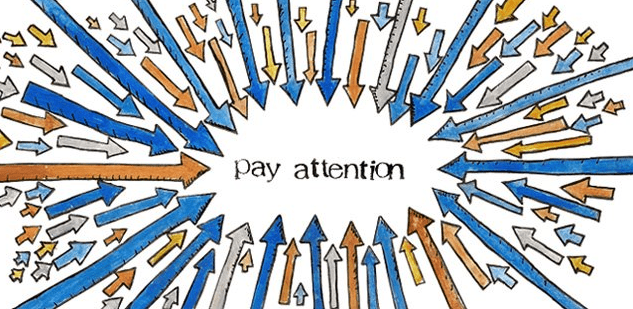 We develop and maintain situational awareness by being perceptive about what is happening around us. To be perceptive, we must pay attention to what is going on in our environment. We can employ all of our senses to help us pay attention – seeing, hearing, feeling, tasting and smelling. However, if we let our guard down, our awareness of things can slip by… REALLY big things. One way of letting our guard down is complacency. [tweet this]
We develop and maintain situational awareness by being perceptive about what is happening around us. To be perceptive, we must pay attention to what is going on in our environment. We can employ all of our senses to help us pay attention – seeing, hearing, feeling, tasting and smelling. However, if we let our guard down, our awareness of things can slip by… REALLY big things. One way of letting our guard down is complacency. [tweet this]
Complacency
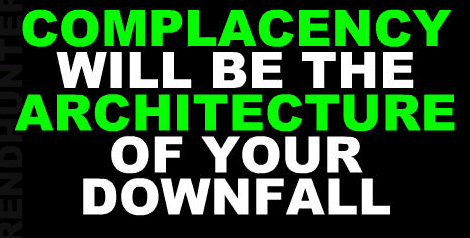 Webster’s dictionary defines complacency as: A feeling of self satisfaction when accompanied by an unawareness of actual dangers or deficiencies; an instance of unawareness or uninformed self satisfaction.
Webster’s dictionary defines complacency as: A feeling of self satisfaction when accompanied by an unawareness of actual dangers or deficiencies; an instance of unawareness or uninformed self satisfaction.
On Guard!
The “guard” you should be “on” is another way of describing your level of alertness. [tweet this] So long as you are awake your senses are paying some level of attention to what is happening around you. However, specific and purposeful attention requires effort… and focus.
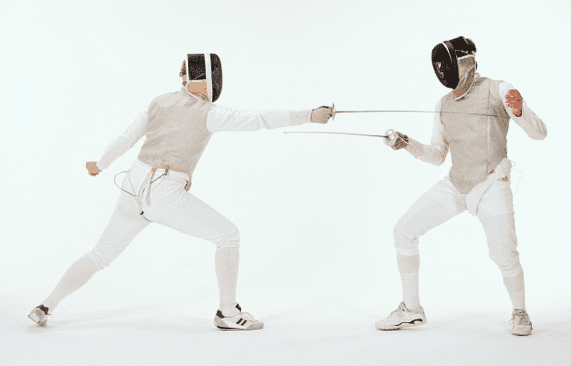 For example, when you are in an unfamiliar environment, such as the downtown of a major city, it is wise be on guard – alert – for dangers that are around you. Large crowds and heavy traffic may be unfamiliar to you. The air may be filled with many sounds – noises – you are not used to hearing. There may be also be many smells for your nose to process and comprehend. If your guard is up, your brain will be a busy place – trying to make sense of it all.
For example, when you are in an unfamiliar environment, such as the downtown of a major city, it is wise be on guard – alert – for dangers that are around you. Large crowds and heavy traffic may be unfamiliar to you. The air may be filled with many sounds – noises – you are not used to hearing. There may be also be many smells for your nose to process and comprehend. If your guard is up, your brain will be a busy place – trying to make sense of it all.
Orienting
As you engage in different activities, what you pay attention to varies. When driving your car you pay attention to the roadway, obstacles and other drivers. When playing sports you pay attention to your equipment, your field of play and the opponent. When at an amusement park you pay attention to the rides, the lines, and the funnel cake vendors. You instinctively – intuitively – know what to pay attention to. However, you can be fooled.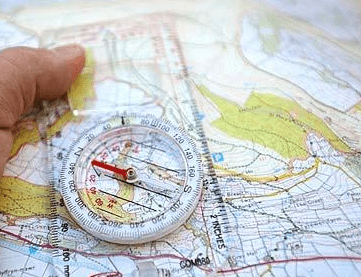
When walking in the crowded downtown of an unfamiliar city you may be highly on guard for pickpockets, assuming they lay in wait to lift the valuables from unsuspecting tourists like yourself. This hyper-alert level may be taxing and stressful. But what about while enjoying an amusement park? Most of us would admit we are not as on guard for pickpockets while walking through an amusement park because the environment makes us comfortable, relaxed… and complacent.
Comfort Breeds Complacency
The more time you spend in a comfortable environment without experiencing uncomfortable outcomes the more relaxed you can become in that environment and this is when you can let your guard down. This can be especially detrimental when the successful past outcomes you have experienced were a result of luck, not skill. And it can be even more detrimental when the complacent individual is lulled into thinking the past successes were a result of superior knowledge, skills, abilities and strong situational awareness – not luck.
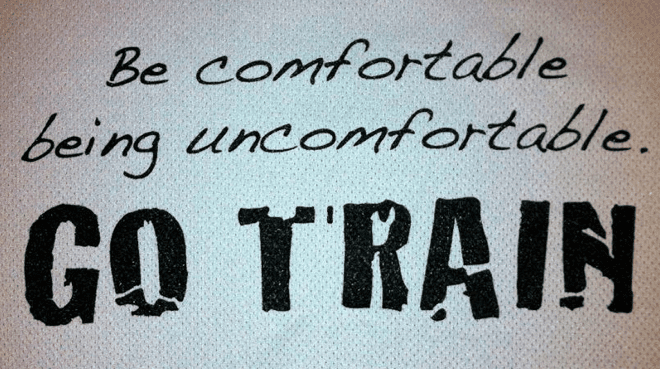
Complacent individuals often suffer from flawed situational awareness because letting the guard down erodes the first level of their situational awareness development – perception. It is perception that allows you to become aware of what is happening around you. [tweet this] It is the foundation of your situational awareness – capturing the clues and cues that form understanding. Understanding – or comprehension – is the second level of situational awareness. This becomes the foundation for the highest level – projection – predicting future outcomes. It all hinges on being alert – being on guard – always training and always on guard for the things that can kill you.
Chief Gasaway’s Advice
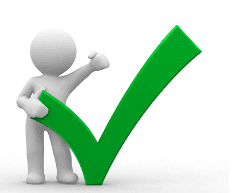 In general, the more experience you get the better you become at your work. Your knowledge increases, your skills improve and your abilities become advanced. When you are on guard, your situational awareness also improves because experience helps you know what clues and cues are important. Experience helps you efficiently sort through volumes of information and identify the most important things you need to know for good decision making.
In general, the more experience you get the better you become at your work. Your knowledge increases, your skills improve and your abilities become advanced. When you are on guard, your situational awareness also improves because experience helps you know what clues and cues are important. Experience helps you efficiently sort through volumes of information and identify the most important things you need to know for good decision making.
However, sometimes experience also leads to complacency. [tweet this] Be on guard. Always on guard. Treat every hazardous work environment as if it is new to you, even if you have worked in this environment for years. Be alert, be open minded and be vigilant to what is happening, what it means, and how the conditions might change suddenly to your detriment.
Over train! If you work in an environment that can kill you, you simply cannot train enough. Make training scenarios as realistic as safety will allow. Think through and discuss the components of your training that cannot be recreated due to safety issues. This helps improve awareness of harmful conditions that can sneak up on you.
Action Items
 1. Discuss a time when you were complacent and, as a result, let your guard down. What were the consequences? Did it result in an injury or were you lucky? Discuss what you learned from the experience.
1. Discuss a time when you were complacent and, as a result, let your guard down. What were the consequences? Did it result in an injury or were you lucky? Discuss what you learned from the experience.
2. Discuss a time when your situational awareness eroded as a result of being complacent. What clues and cues did you miss? How did that impact your decision making? What were the consequences from your flawed situational awareness?
3. Discuss three ways you can reduce complacency in your workplace. What can be done to help co-workers reduce complacency? What can others do to help you reduce your complacency?
___________________________________________________________
The mission of Situational Awareness Matters is simple: Help first responders see the bad things coming… in time to change the outcome.
Safety begins with SA!
___________________________________________________________
Share your comments on this article in the “Leave a Reply” box below. If you want to send me incident pictures, videos or have an idea you’d like me to research and write about, contact me. I really enjoy getting feedback and supportive messages from fellow first responders. It gives me the energy to work harder for you.
Thanks,
Email: Support@RichGasaway.com
Phone: 612-548-4424
Facebook Fan Page: www.facebook.com/SAMatters
Twitter: @SAMatters
LinkedIn: Rich Gasaway
YouTube: SAMattersTV
iTunes: SAMatters Radio


Hey Rich,
I would like to post this on my Discussion group : “Systematic and systemic Risk Management”
Is it OK ?
Kind regards , Frank
(Linkedin – connection, see my profile)
Frank,
Absolutely. Please consider a link to the article on my website.
Thanks for sharing.
Rich